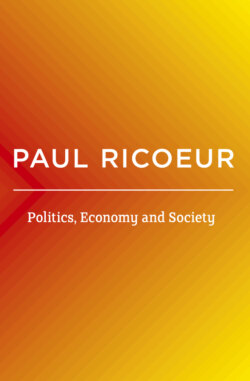Politics, Economy, and Society

Реклама. ООО «ЛитРес», ИНН: 7719571260.
Оглавление
Paul Ricoeur. Politics, Economy, and Society
Table of Contents
Guide
Pages
Politics, Economy, and Society. Writings and Lectures, Volume 4
Copyright Page
Editor’s Introduction
Notes
Note on the French Edition
1 The Adventures of the State and the Task of Christians. The Twofold Biblical “Reading” of the State
The Twofold History of Power
Our Twofold Political Task
Notes
2 From Marxism to Contemporary Communism
Marxism’s Scope
The Petrification of Marxism
Notes
3 Socialism Today
The Economic Level: Planning
The Social and Political Level: Democratic Governance
The Cultural Level: Socialist Humanism
Notes
4 Hegel Today
The Phenomenology of Spirit, or How to Enter into Hegel’s System. Three theses
Three questions
The Encyclopedia of the Philosophical Sciences or Fifteen Years Later
Logic
The philosophy of nature
The philosophy of spirit
Questions
Fascinations
Resistances
Notes
5 Morality, Ethics, and Politics
[The Capable Human Being]
[From the Capable Subject to the Historical Subject]
[Politics, the Milieu Where the Ethical Aim is Fulfilled]
[The Political Paradox]
[Responsibility and Fragility]
Notes
6 Responsibility and Fragility
Rival Cities
Paradoxes of the Political
International Society
Notes
7 The Paradoxes of Authority
[Reciprocity and Dissymmetry]
[The Foundation Before the Foundation]
[Authority and Mutual Indebtedness]
8 Happiness, Off Site
Happiness and What is One’s Own
Happiness and Close Relations: Friendship
Happiness and the Distant: Justice
Notes
9 Is Crisis a Phenomenon Specific to Modernity?
Some “Regional” Concepts of Crisis
Criteria for a “Generalized” Concept of Crisis
Criteria for a “Modern” Concept of Crisis?
Notes
10 Money: From One Suspicion to the Next
The Moral Level
The Economic Level
The Political Level
Notes
11 The Erosion of Tolerance and the Resistance of the Intolerable
12 The Condition of the Foreigner. Basic Distinction: “Foreigner” versus “Member”
The Foreigner “Chez Nous”
The foreigner as visitor
The foreigner as immigrant
The foreigner as refugee
Notes
13 Fragile Identity: Respect for the Other and Cultural Identity
The Question of Memory
What is the Cause of the Fragility of Identity?
The Other Experienced as a Threat
The Heritage of Founding Violence
Notes
14 What New Ethos for Europe?
The Model of Translation
The Model of the Exchange of Memories
The Model of Forgiveness
Notes
15 The Dialogue of Cultures, the Confrontation of Heritages
Notes
16 The Crisis of Historical Consciousness and Europe
[Exhausting the Project of the Enlightenment?]
[From Dissolution to Reconstruction]
Notes
17 The Struggle for Recognition and the Economy of the Gift
[Recognition]
[The Gift]
Notes
Origin of the Texts
Index
POLITY END USER LICENSE AGREEMENT
Отрывок из книги
Paul Ricoeur
Edited and with an Introduction by Pierre-Olivier Monteil
.....
First rule: it is not legitimate (nor even possible) to deduce a politics from a theology. For any political commitment is at the point of intersection of a religious or ethical conviction, of information of an essentially profane nature, of a situation that defines a limited number of available possibilities and means, and of a more or less risky option. It is not possible to eliminate from political action the tension arising out of the confrontation of these various factors. In particular, conviction which is not tempered by a reflection on the possible would lead to a demand for the impossible by demanding perfection: for if I am not perfect in everything, I am perfect in nothing. On the other hand, a logic of means, not tempered by a meditation on ends, would easily lead to cynicism. Purism and cynicism are the two extremes between which political action moves, wavering in its calculated culpability back and forth between the morality of all or nothing and the technique of realization.
Second rule: political engagement makes no sense for the Church but only for believers. This seems clear in principle, but it is not yet the case in fact: Churches are themselves cultural realities that weigh in the balance of power, and there still remains a more or less unacknowledged, residual, shameful politics of the Church. This is why the secularism of the State has not yet been realized: we are witnessing the death-throes of political and clerical Christianity, and this interminable agony is demoralizing for believers and unbelievers.
.....